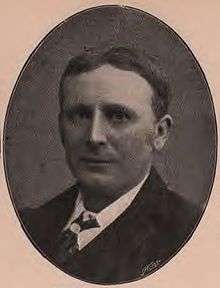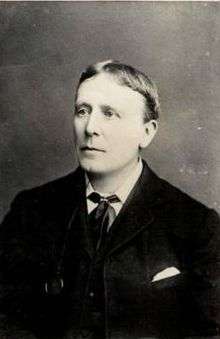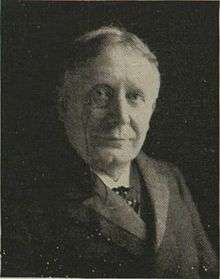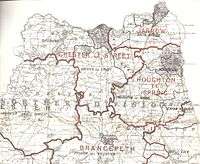Llewellyn Atherley-Jones
Llewellyn Archer Atherley-Jones QC (1851 – 15 June 1929) was a radical British Liberal Party politician and Barrister who eventually became a judge.



Background
Atherley-Jones was the son of Ernest Jones, a prominent Chartist leader who was also a Barrister (who adopted a hyphenated surname to include his mother's maiden name) and Jane Barfield of Cumberland. He was educated at Manchester Grammar School, followed by Brasenose College, Oxford. He married, in 1876, Elizabeth Fanny Lambert, of Durham. They had one son. She died in 1927.[1]
Early legal career
He read for the Bar at the Inner Temple and was called to the bar in 1875 and joined the North Eastern Circuit where he was initially involved in criminal defence work. He was also taken on as the Barrister for the Miners' National Union, and represented the miners at an inquiry into a mining accident (an underground explosion) at Seaham, County Durham in 1880. He was appointed Recorder of Newcastle in 1905. He served as a Justice of the Peace in Berkshire.[2]
Politics

Sharing his father's radical politics, Atherley-Jones became Hon. Secretary of the Westminster Committee which supported William Ewart Gladstone on the question of the Bulgarian atrocities. He was committed to the left-wing of the Liberal Party, although in 1881 he declined an invitation to fight a by-election in Leeds against Herbert Gladstone, son of the Liberal leader. He was chosen as candidate for Ealing in 1884, but as the election approached, had a much better offer from North West Durham which was an area with a large number of miners and where a Liberal victory was much more likely. He was duly selected at the beginning of August 1885 and won the seat with 62% of the vote in the general election in November.[3] Perhaps his greatest contribution to the Liberal Party, however, was his description of New Liberalism, encouraging the Party to embrace the politics of mass working-class appeal, rather than being sidetracked by peripheral concerns. At his eighth and last General Election contest, in December 1910, he was comfortably re-elected again;
| Party | Candidate | Votes | % | ± | |
|---|---|---|---|---|---|
| Liberal | Llewellyn Atherley-Jones | 8,998 | 65.1 | ||
| Conservative | James Ogden Hardicker | 4,827 | 34.9 | ||
| Majority | 4.171 | 30.2 | |||
| Turnout | 75.3 | ||||
| Liberal hold | Swing | ||||
In 1913 he resigned his seat as he was appointed a Judge of the City of London Court.
Judge
From 1913 onwards, he devoted the rest of his career to the judiciary. As a judge at the Old Bailey in the 1920s, he acquired a reputation for dealing sympathetically with men charged with consensual homosexual offences.[5]
Publications
- Miners’ Manual, 1882
- The Miners’ Handbook to the Coal Mines Regulation Act, 1887
- articles in The Nineteenth Century, Edinburgh Review, and other reviews on social and political questions
- The Fall of Lord Paddockslea, and other novels published anonymously
- Commerce in War: a Treatise on International Law
- The Law of Children and Young Persons
- Looking Back, 1925
- a frequent correspondent of The Times
References
- ‘ATHERLEY-JONES, His Honour Judge Llewellyn Archer’, Who Was Who, A & C Black, an imprint of Bloomsbury Publishing plc, 1920–2007; online edn, Oxford University Press, Dec 2007 accessed 23 Jan 2014
- ‘ATHERLEY-JONES, His Honour Judge Llewellyn Archer’, Who Was Who, A & C Black, an imprint of Bloomsbury Publishing plc, 1920–2007; online edn, Oxford University Press, Dec 2007 accessed 23 Jan 2014
- British parliamentary election results 1885-1918, Craig, F.W.S.
- British parliamentary election results 1885-1918, Craig, F.W.S.
- Queer London by Matt Houlbrook ISBN 9780226354620
External links
- Works by or about Llewellyn Atherley-Jones at Internet Archive
- Hansard 1803–2005: contributions in Parliament by Llewellyn Atherley-Jones
| Parliament of the United Kingdom | ||
|---|---|---|
| New constituency | Member of Parliament for North West Durham 1885–1914 |
Succeeded by Aneurin Williams |